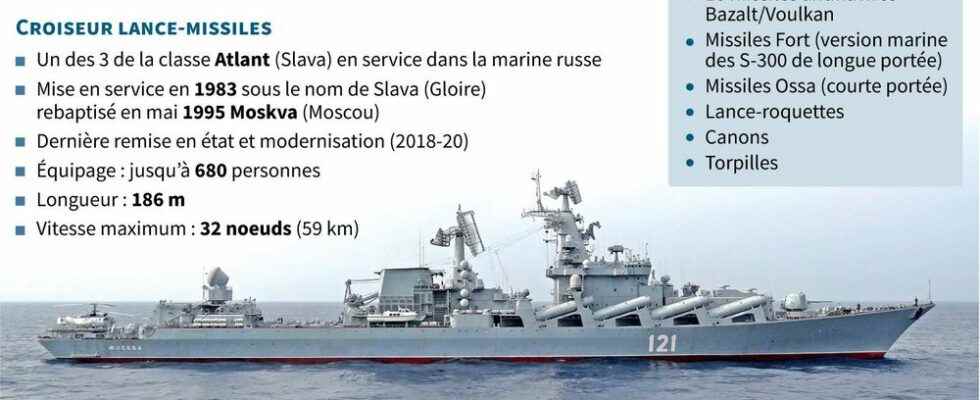A shipwreck. In every sense of the term. Thursday evening April 14, the Kremlin confirmed the information it had denied the day before: the missile cruiser “Moskva”, flagship of the Russian fleet in the Black Sea, has indeed sunk. In fact, this flagship of the Russian Navy was hit by one or two Neptune missiles on Wednesday, April 13, according to the Ukrainian Defense Ministry.
This version of the facts is however contested by Moscow, according to whom the explanation is quite different: a simple fire would have spread to a reserve of ammunition which would have caused an explosion, damaging the “Moskva” irreparably. The rough sea would also have played a role… “While being towed to the port of destination, the ship lost its balance due to damage to the hull, justified the Russian Ministry of Defense. A fire having declared itself after the explosion of ammunition, and taking into account the rough seas, the ship sank.” The crew of 510 men was apparently able to be evacuated.
Missile fire or fire? Whatever the good version, the shipwreck is proven and it is, also, media. Because, in the information war in which the belligerents are engaged, the loss of such a ship is both humiliating for Putin, demoralizing for his army and… impossible to hide from Russian public opinion. And there is cause for concern for the Kremlin. Because if the Ukrainian army is telling the truth, it means that kyiv is now capable of firing missiles that threaten the entire Russian fleet without the latter having a satisfactory anti-aircraft defense. If, on the contrary, the Kremlin’s version is correct, it is hardly more satisfactory for Moscow. Because the accident on board the “Moskva” would indicate incredible negligence in the safety procedures.
Authorities in southern Ukraine claimed responsibility for the heavy damage inflicted on the cruiser Moskva.
VINCENT LEFAI, SOPHIE RAMIS / AFP
One thing is certain: it is the largest Russian warship damaged by enemy fire since 1941 and the worst loss suffered by a military fleet since the torpedoing of the Argentine cruiser Belgrano during the Falklands War (Falklands Islands, in English) in 1982! For Admiral Lord West, a former First Sea Lord and Chief of Staff of Britain’s Royal Navy, the loss of the ship is “very embarrassing” for Moscow. And that, well beyond the military aspect of things. “It has a huge impact,” he told the BBC. “Putin loves the navy. When he came to power, the first part of the old Soviet forces he focused on was the navy. He always had a soft spot for her.”
The “Moskva” (186 meters long; range: 19,000 kilometers; speed: 32 knots, or 59 km/h) is not the first maritime victim of the war since its beginning on February 24th. At the end of March, the amphibious landing ship “Saratov” had been hit and sunk by a Ukrainian attack in Berdiansk, a port in the Sea of Azov conquered by Russia a few days earlier.
The “Moskva” had already been talked about
The destruction of the “Moskva” is even more symbolic because this building with a heliport had already been talked about at the start of the conflict. In the Black Sea, his crew had demanded the surrender of 13 soldiers posted on Serpents’ Island, a Ukrainian islet located 33 kilometers from the coast, near the territorial waters of Romania. The small island garrison had then responded by radio to the commander of the “Moskva” in a laconic manner and in flowery terms: “Russian ship, fuck you!” The anecdote, widely relayed on social networks, already belongs to the mythology of the Ukrainian resistance.
On the military level, the destruction of the “Moskva”, which now lies at the bottom, should not significantly influence the course of the war. True, the ship was capable of accurately firing Kalibr cruise missiles into Ukrainian territory. But, in reality, it is mainly from its land positions that Russia launches most of its shells. However, the Russian navy, apparently vulnerable to Ukrainian fire, could be forced to reinforce its anti-aircraft protection on the coasts or, altogether, move away from them by taking to the open sea. And there is this harsh reality, which counts a lot in psychological warfare: after the failure of the Blitzkrieg against kyiv and Kharkiv in northern Ukraine, the sinking of the cruiser “Moskva” deals a serious blow to the prestige of Vladimir Putin’s invading army.
